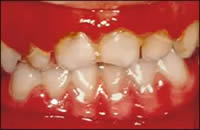What is a toothache?
Toothache refers to dental pain around the teeth or jaws. It is common in those who neglect their oral hygiene. It is often the reason for visits to the dentist. Severe pain may lead to loss of sleep, absence from school or work and also affect social function and well being.
What causes toothaches?
- The most common cause of a toothache is tooth decay (dental caries).
- Other common causes are:
- Gum (periodontal) disease
- Sensitive teeth
- Cracked tooth
- Oral infections
- Pain in the jaw joint
- A toothache can be caused by a problem that does not originate from a tooth or the jaw such as:
- Sinus blockage
- Earache
 |
 |
| Tooth decay (dental caries) | Gum disease |
What can a toothache do to you?
If the underlying cause is not treated, it may lead to:
- Difficulty in eating
- Difficulty in sleeping
- Swelling over the affected site
- Limited mouth opening
- A dead (non vital) tooth
- Tooth loss
In children, the following complications may occur:
-
The related tooth may have to be extracted and early loss of teeth may lead to other dental problems e.g. malocclusion. (incorrect relation between the teeth of upper and lower jaw)
- Swelling may progress and interfere with mouth opening, breathing and eating.
- Your child may require hospitalisation for treatment.
- The event may cause psychological trauma to the child.
What can you do to relieve a toothache?
- Seek treatment from your dentist as soon as possible:
- Meanwhile, try the following remedies to relieve your pain temporarily.
- Take a painkiller.
- Rinse or floss gently to remove anything in between your teeth.
- Numb your gums e.g. sucking on ice.
How is a toothache treated?
A thorough oral examination can help determine whether the toothache is coming from a tooth or jaw problem and the cause is treated accordingly by the dentist.
How can you prevent toothaches?
- Practise good oral health care:
- Brush teeth thoroughly every day especially after meals and before bed.
- Clean between teeth daily with floss
- Regular dental check-ups
- Cut down the amount and frequency of sugary foods or drinks.
- Eat a well-balanced diet with plenty of fruits and vegetables.
| Last reviewed | : | 23 August 2019 |
| Writer | : | Dr. Laila bt. Abdul Jalil |
| Dr. Che Noor Aini bt. Che Omar | ||
| Dr. Sharol Lail b. Sujak | ||
| Dr. Azillah bt. Mohd Ali | ||
| Dr. Norrizan bt. Basir | ||
| Dr. Chew Yoke Yuen | ||
| Dr. Doreyat b. Jemun | ||
| Reviewer | : | Dr. Sharol Lail bin Sujak |







